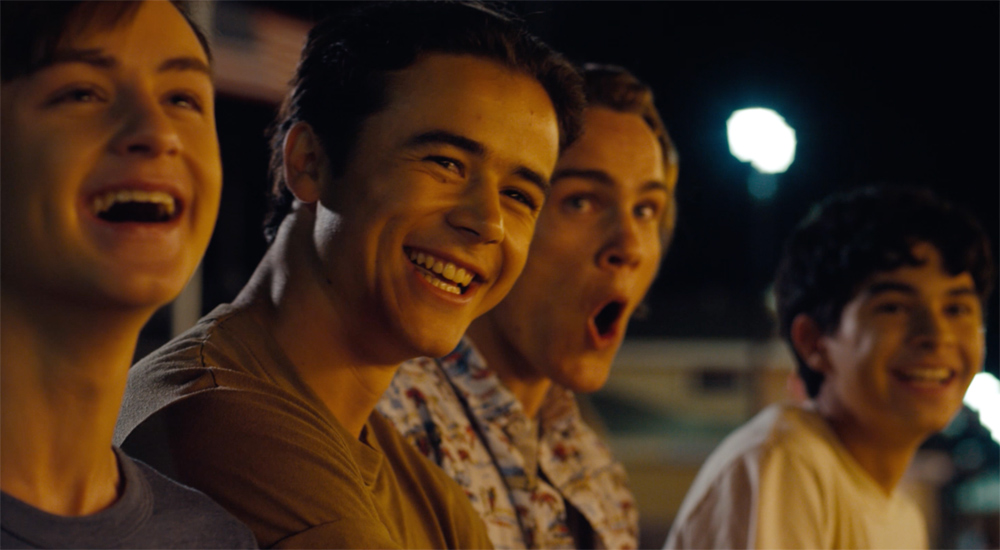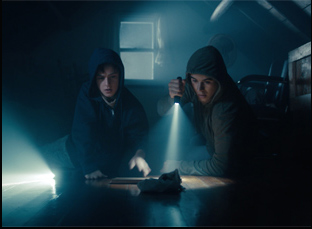On the first night shoot of “Low Tide,” Kevin McMullin found himself unexpectedly in the middle of a turf war. For his debut feature, the writer/director may have been intimately familiar with his locations, having grown up on the Jersey Shore, but what he couldn’t have possibly have known when shooting on the beach was that while the sand may have been the property of one town, the pier where he had planned to assemble his characters Red (Alex Neustaedter), Smitty (Daniel Zolghadri), Alan (Keean Johnson) and his younger brother Peter (Jaeden Martell) for a scene in which they were musing about their future, belonged to another.
“We were kicked out and then we just ran around to the beach, we set up some lights and we shot it,” recalls McMullin. “I think the scene ended up turning out better there than it would’ve under the pier, so it was a happy accident and at the time, we were [thinking], “Oh man, we lost half a day.” But in retrospect, I think making movies is a process of happy accidents where your best of intentions go out the window.”
Letting go of his plans works undeniably well for McMullin on “Low Tide,” where the spark of spontaneity gives an extra bit of torque to the energetic thriller, but it doesn’t work out so well for the quartet of teen townies who break into the houses of unsuspecting tourists who come to enjoy the beach and boardwalk for the summer and leave with a few less valuables than they arrived with. The crimes are small since the gang is just having fun, enlivening a humdrum life where the local amusements can’t be that entertaining to them when they often have had to work the attractions to make ends meet, but things change upon hearing about the death of a local recluse who Alan once heard turned down $2 million for his property leaving them to wonder what’s inside and discovering it’s more than some prized Cuban cigars, the group becomes splintered over what to do with the loot while they’re closely watched by a cop (Shea Whigham) who’s been investigating the home invasions.
There may not be much finesse to the acts of the burgeoning criminals, but there’s considerable sophistication in how McMullin brings their story to the screen in “Low Tide,” which has shades of ‘80s Amblin adventures and hard-boiled noirs of the ‘40s and ‘50s but becomes something entirely its own in blending the two. Although the filmmaker makes the tricky tone and sleek presentation look effortless, “Low Tide” was far from easy to pull off, with rain falling on days when McMullin needing the sun and vice versa and the result of years both before and after the shoot to get the final product just right. It was recently our pleasure to talk to the writer/director on the eve of the film’s release, following a premiere at the Tribeca Film Festival earlier this year, to talk about how it all came together.
I grew up on the Jersey Shore and sitting down to write a movie, I knew I wanted to feature that landscape that I know really well – both the people, but also the actual setting of forests and water. I was happy to have a movie that showed off the landscape because it really is a gorgeous part of the country and you just don’t get skies like that and the way the light reflects off the water in the Jersey Shore in the peak of season. The generative image of the movie was actually the very last shot on the boat – and I don’t want to give more away, but it was fun to trace that backwards and see how we got there. I had this idea of these blue-collar kids in a shore town who would rob summer vacationers of petty things, but they stumble upon something much more valuable.
It was intriguing to me that I could easily seeing you transporting the dialogue to a 1930s noir with a bunch of guys on the lam…
Well, I’m a big John Huston fan, so it maybe comes from watching a lot of his stuff. [laughs]
But you largely leave the adults out of this, except for Sgt. Kent, the cop on their trail.
It was always from the point of view of being a teen. That’s a neighborhood where there’s a lot of latchkey kids and I remember going a week without ever seeing my parents, even though technically we’re in the same house because they’d be out going to work and I’d sleep in a little bit and then I’d be out with my friends or going to my job and I’d stay out really late. Summers can be really hot and hazy and parentless and I wanted to explore what happens when kids left to their own devices. I think it turns into “Lord of the Flies” and it was fun to pursue that.
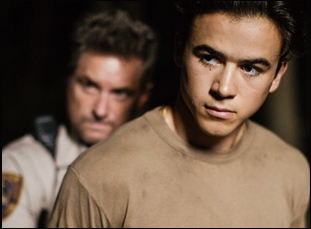
Once you have the actors, was it exciting to see the group dynamic separate from what you wrote?
Yeah, it starts in the casting process where you start to see how different young actors are going to approach their roles. It was [already] exciting for me every day to show up while I was outlining it and just trying to figure out what would this character do and what would this character do, and as you flesh out those characters, they start to speak back to you. It sounds really corny, but they really do and you just follow where they’re going and keep revising and making it a little tighter, so by the time we’re casting, I know the script so well and what’s most interesting is when someone walks in the room and they give a complete new reading, a new take on that character and then the dominoes start falling in your head like “Oh, if we cast him, we can do this.”
Case in point, one of those big moments for me was with Daniel Zolghadri, who plays the character of Smitty. Daniel is such a gifted actor and he’s really intelligent, and we needed somebody like that to play Smitty, to be both a bit of the comic relief in the beginning, but somebody the audience would believe could transition towards that more machiavellian, darker character, and and Daniel was the guy. He knocked it out of the park.
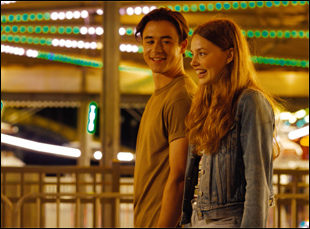
No, we were an extremely low budget operation, and on the Jersey Shore, they’re not used to lots of films, so when they heard we were coming, they were very excited, but that being said, we were shooting July and August – peak tourist season – and they weren’t amenable to us shutting any rides down, so it was like, “You can come, but you can’t set up lights and you’re going to have to make do with the crowd,” which influences from my point of view what lens we’re on and where we block the actors. We’re dealing with real people walking by and there’s a ton of challenges. But I feel like it adds a certain texture, like it enlivens the movie in a way that it wouldn’t if everyone you saw in the background was a paid extra.
Was that the craziest day of filming?
The finale stuff at the beach was pretty crazy. Our second week of shooting was during a heat wave in July, so that was pretty nuts, just dealing with the actual elements was very difficult – water and sand, especially on a low budget. We couldn’t even afford many doubles of the kids’ jeans, so if they were jumping in the water and they got wet, the costume designer would be in the woods with a generator and a blow dryer, trying to dry the pants real quick so we could do another take. It was really a bare-bones operation, but I think adversity tends to bring people closer together, especially this cast and crew. Everyone bonded in the Holiday Inn parking lot because we were all there for the right reasons. No one was getting paid, so everyone was there to just hopefully tell a good story.
You actually avoid a second scene set on the water brilliantly by presenting Red’s backstory involving a pool in still photographs. How did that sequence come about?
That was actually supposed to be an all-day shoot and it was designed to be much bigger dream sequence, but then it kept getting reduced and reduced in the schedule to the point where we only had one-third of the day to do it. We shot it with video [because] the original intention was we were going to use it as a video, but when we got to the editing, we found that the bookends of that scene are actually photographs that Sgt. Kent is presenting to Alan, so that series of photographs made a lot of sense. I didn’t realize until we were done that Scorsese has done it, so subconsciously there’s a good precedent for it, but it ended up working for the scene.
The music in that scene is particularly beautiful. What was it like working with Brooke and Will Blair for the score for this?
The Blairs are the best. I don’t have a musical vocabulary, but I know what I like, so I can present a bunch of references and past that, like I can maybe point to a couple layers like, “I love the violins from this [or] the rhythm from this,” [but] they’re wizards. They can mash it all together and a day later, they send you something that’s perfect. The score is still stuck in my head in the best way. I’ve seen the movie now [a lot] and I still really love it.
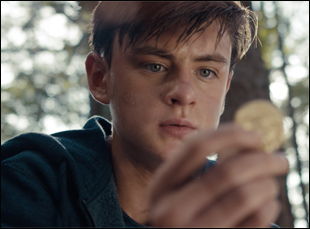
Yeah, I had made shorts and then longer format stuff as a student and I think I always had the dream of having enough resources to make a real movie. I was fortunate in how it took off with how it sparked for some producers, but ever since I got out of film school, I was hustling doing commercials and I would always set aside a little bit of time every year when I knew I could afford my rent and food and sit there and just try and write something. There were a couple false starts, but I found this idea and then I stuck with it and just piecemealed the script over a little while.
It’s not lost on me that so many of my friends that are pursuing it and it’s very difficult to cobble together those resources, so once you have the momentum, there’s no choice, but to double down on it, so that meant Colin Alexander, our sound designer, worked on the movie an extra year – nights and weekends with me. Every time I booked a commercial, I’d call him back up and we’d go work on it a little bit more and do another mix and so we started to make it one percent, two percent better [each time] because at the end of the day, I want to be able to sit here and talk to a person like yourself and say we did really do the best we could and be proud of the movie, which I am, especially those kids’ performances.
When it’s your first time doing a feature, is it what you expected?
You can’t prepare for it. I read a ton of books, and I love hearing stories of other filmmakers and hearing what their first time is like, but ultimately you’re thrown into the water and you’ve got to learn how to swim a little bit. It’s really daunting, but ultimately, the same principles apply to when I was 13, making movies in my backyard. It’s what’s in the frame and what’s the greater story you’re trying to tell.
“Low Tide” opens on October 4th in Los Angeles at the Laemmle Music Hall and New York at the Quad Cinema. It is also now available on DirecTV.




